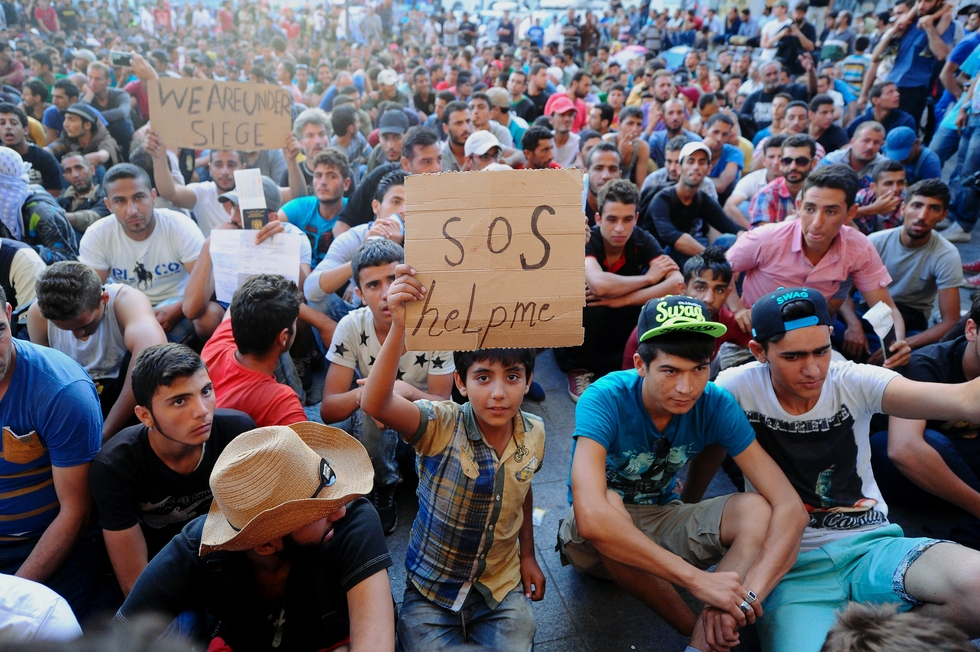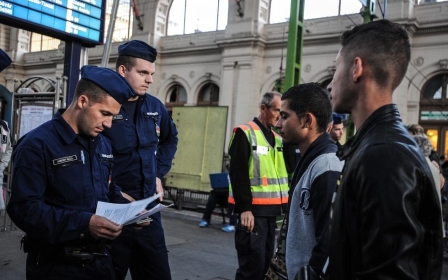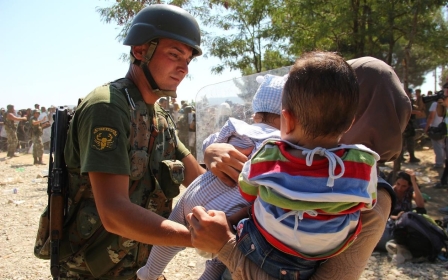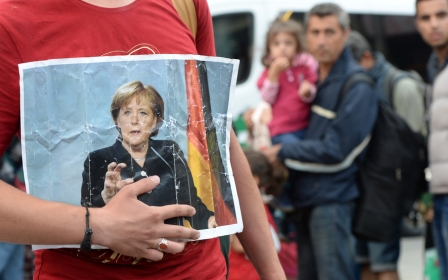The Middle East's crisis is Europe's too

We live in an age of sentimentality and brutality - little different from Victorian Britain or Tsarist Russia. For the latest dollop of sentimentality, go no further than Bob Geldof, who offered to throw open the doors of his homes in London and Kent as a "personal response" to the Syrian refugee crisis; or Bono, who claimed, on the basis of nothing, that something incredible is happening in Europe. Perhaps Lenny Henry can join in with a red nose day, or, as this is about Syria, should that be red limb day? Maybe Angelina Jolie could adopt a child? The German tabloids would love that. They have just published a "Welcome to Berlin" guide in Arabic.
Of brutality, there are no more reliable suppliers than 10 Downing Street, not that either Geldof or Bono are likely to be on the streets outside demonstrating during Israeli Prime Minister Benjamin Netanyahu’s visit on Thursday. David Cameron’s response to the refugee crisis is to accept 4,000 a year for the next five years and to announce that drone strikes have executed two Britons in Syria. He and Francois Hollande are itching to start an air campaign against the Islamic State (IS), as if the militant group is the root cause of the refugee flows.
Now I acknowledge that evidence is a tool used fitfully in firing a drone. Best guesses - what one neighbour whispered about another, what a target appeared to be holding from 500 feet away - are all safer bets. But even so, the link between what happened to the toddler Aylan Kurdi and IS eludes me.
If the drone strike is about exacting revenge on the killers of Syrian children, the facts point to a different conclusion: Of the 2,236 child deaths documented by the Syrian Network for Human Rights this year, 1,804 were caused by the Syrian government. IS killed 104 children and International Coalition Forces - that’s you and me - killed 58. By February last year, the UN estimated that 10,000 children had been killed in the civil war, and many more subject to unspeakable horrors such as rape, torture and recruitment for combat.
The truth about the Kurdi family is, as ever, mixed. As told to Middle East Eye by Abdullah, the surviving father of Aylan, and Abdullah’s uncle Khalid, it’s the story of a long march - a barber who moved from Damascus to Kobane to Tel Abyad and finally to Istanbul in search of a living wage. He was joined by his family when IS took control of Kobane. One year passed since then, in which they struggled to make ends meet in the Eyup neighbourhood of Istanbul. What made the Syrian Kurd dream of a better life in Europe on his second attempt to break in? Not IS. And definitely not his uncle.
The uncle, Khalid Sheno, said: “Europe will never help us. I'd rather live in Kobane and eat bread then to go to Europe. Abdullah walked into the danger with his eyes closed. I told him to return to Kobane instead of going to Europe. But he dreamed of something else.”
Back to Europe, where something incredible is said to be happening. Jean Claude Juncker, the EU commission president, pressed on Wednesday for a compulsory relocation of an extra 120,000 migrants - a plan that the new boys on the block, the Czech Republic, Slovakia, Poland and Romania are less than enamoured with. Their generosity appears to be tempered by religious preference. Slovakia, Cyprus and a French mayor were all quoted as saying they preferred Christian refugees.
The countries that are doing most to support the war in Syria, do least in accepting the consequences of those wars. The eight countries that have sent most weapons to Syria have accepted two percent of the refugees Germany has taken in, according to Stop The War.
Even the response of Germany, which has said it can take in 500,000 Syrian refugees a year, may have more to do with its brain than its heart. Unlike Britain, Germany’s population is falling, and doing so fast. The EU commission’s projection is that it will fall from 81.3 million in 2013 to 70.8 million by 2060. As it does, the so-called dependency ratio, the proportion of expensive older people to younger, wealth-generating people will rise.
Germany will be unable to fulfil its needs through the European labour market alone. Lutz Schneider, an economist who examined the consequences of immigration for the Bertelsmann Foundation, predicted to Spiegel Online that the average annual number of immigrants from EU countries will decline to 70,000 by 2050. "This is why we will be even more dependent on people from third countries immigrating to Germany for work in the future, people who now come to Germany primarily as refugees," she said.
None of which stops the feelgood factor from spreading. The we-must-do-something brigade is in full cry. “Turning back boats is not European,” Junckers said.
But let’s for a moment be honest. The reaction to Aylan Kurdi has been one giant selfie, a portrait of ourselves taken by people who remain conflicted about their identity, perturbed about their ethnic and religious minorities, and anxious about the future. It's about us, not them. It's not about Syrians nor the sacrifice of poor nations around them. (Lebanon and Jordan have taken in four million refugees so far.)
Nor is it about children. The desperate picture of Aylan Kurdi’s washed-up corpse erases the memory of all the child victims of this vicious four-year conflict. Who now remembers Hamza al-Khateeb, a 13-year-old boy from Deraa, who was swept up by Syrian President Bashar al-Assad’s security forces on 29 April 2011, and whose body was returned a month later, broken, battered, covered in cigarette burns, and whose penis was cut off?
Hamza was called in headlines at the time a symbol of the Syrian revolution. At that time it was peaceful. IS did not exist, and yet the world stood by and watched Assad turn an uprising into a sectarian civil war.
Nor are Aylan and Hamza the only child symbols of conflict in the Middle East. Muhammad al-Durrah, Iman Hijo, the four boys killed on the beach in Gaza last year, and Ali Dawabsheh, the baby burned to death in an arson attack in the West Bank, are all symbols of the Palestinian conflict who have aroused plenty of emotion but failed to move policy in the West.
Aylan Kurdi has not shaken Europe out of its torpor. But his brutal death has rammed home one point, which we spent the whole summer of drownings in the Mediterranean trying to deny.
The Middle East is Europe’s neighbour, whose conflicts and waves of human misery no border fence is high enough to contain. What’s happening in Iraq, Syria and Libya is a consequence, direct or indirect, of the major policy flaws and wars that Britain, France and America have waged, and continue to wage. The cities of Syria are being gradually levelled to the ground and may never again return to a unitary state.
What’s happening in Egypt, gripped by a military dictatorship and the start of a nation-wide insurgency, is the direct consequence of the British, French, German and American abandonment of the democratic process. As I wrote earlier this year, migration from North Africa was actually dropping until the military coup in 2013, according to Frontex the European Border Agency. If Egypt fails as a state - as it could well do - Egyptians would have no other direction to turn than northwards. The numbers taking to the boats would increase exponentially.
Two battles are being fought by millions of Arabs - the battle for democracy and the battle for a better economic future. On both fronts, Europe has nothing to offer Arab youth. For its policy is to back their tyrants and hold its nose. This is the torpor Europe is in, a continent unwilling to uphold its own democratic standards or share its wealth. The Middle East’s crisis is Europe’s too.
- David Hearst is editor-in-chief of Middle East Eye. He was chief foreign leader writer of The Guardian, former Associate Foreign Editor, European Editor, Moscow Bureau Chief, European Correspondent, and Ireland Correspondent. He joined The Guardian from The Scotsman, where he was education correspondent.
The views expressed in this article belong to the author and do not necessarily reflect the editorial policy of Middle East Eye.
Photo: A boy holds a sign reading 'SOS help me' as he sits with other migrants in front of the Keleti railway station in Budapest (AFP)
Middle East Eye propose une couverture et une analyse indépendantes et incomparables du Moyen-Orient, de l’Afrique du Nord et d’autres régions du monde. Pour en savoir plus sur la reprise de ce contenu et les frais qui s’appliquent, veuillez remplir ce formulaire [en anglais]. Pour en savoir plus sur MEE, cliquez ici [en anglais].





